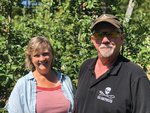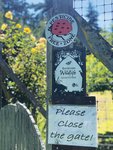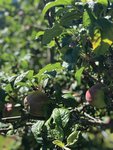When teenage sweethearts and lifelong environmental activists Steve “Bear” and Nancy Bishop traveled to Europe in search of authentic cider, they didn’t realize then, that they were …
This item is available in full to subscribers.
We have recently launched a new and improved website. To continue reading, you will need to either log into your subscriber account, or purchase a new subscription.
If you had an active account on our previous website, then you have an account here. Simply reset your password to regain access to your account.
If you did not have an account on our previous website, but are a current print subscriber, click here to set up your website account.
Otherwise, click here to view your options for subscribing.
* Having trouble? Call our circulation department at 360-385-2900, or email our support.
Please log in to continue |
|



When teenage sweethearts and lifelong environmental activists Steve “Bear” and Nancy Bishop traveled to Europe in search of authentic cider, they didn’t realize then, that they were on an adventure that would change the course of their lives forever.
“After that trip, we realized that we had to plant our own orchard,” Nancy said.
But simply planting old-world cider apples wasn’t enough. The couple had bigger ideas, ideas rooted in environmental stewardship, activism, and a reverence for the natural world. And since the first trees were planted in 2003, the Bishops have pushed themselves, and the craft beverage industry, to raise the bar and deliver the cleanest, highest quality cider possible. That focus and passion led them to become the first USDA-certified organic cidery in the nation.
“This is our 18th year being certified organic,” Bear said. “It took us two years to get the organic certification because it had never been done before, not just locally, but nationally.”
But given recent scandals over food products labeled “Certified Organic,” Trump-era politics and agency appointments, and beverage additives, the Bishops said they felt compelled to take their cidery a step beyond the USDA organic certification.
“We had to go beyond certified organic,” Nancy said. “People’s confidence in certified organic is totally eroded, it’s become corporatized.”
Enter the Real Organic Project.
“We joined these guys because of disillusionment,” Bear said. “We’re both radical environmentalists and this is the only group that was willing to fight. Under Trump, the organic food act was completely destroyed. It was gutted. That’s why we joined these guys; they’re the new radicals.”
Bear said the project’s founding member list reads like a “Who’s Who” of farmer-led, environmental activism.
“They are really motivated, young activists,” Bear said.
The Real Organic Project, according to its founders, was created in response to the lack of enforcement of some USDA Organic standards that were put in place to protect soil health and animal welfare. The goal, the organization’s founders say, is to fight to protect the integrity of the organic label.
“You have to be certified organic to be part of the Real Organic Project,” Bear said.
The Bishops said that in addition to being concerned about the credibility of USDA organic standards, they are concerned with beverage preservatives and the heavy-handed use of sulfites in the wine and cider industry.
“It’s (sulphur dioxide) like putting Round-Up in every beverage,” Bear said. “It’s a pesticide and an herbicide. Velcorin, a microbial agent, is common in most cider, wines, and soft drinks and they don’t have to put it on the label. Velcorin is a total attack, that’s why we joined the Real Organic Project.”
Currently, Alpenfire’s Pirate’s Plank cider carries the Real Organic Project logo on its bottle cap.
“We’re beyond natural when it comes to Pirate’s Plank,” Bear said, and he explained that the cider, in addition to organic fruit, has no added sulfites.
While Pirate’s Plank is currently the only Alpenfire Cider carrying the Real Organic Project certification, Nancy explained that the remainder of the Alpenfire product line has very low sulfite levels – levels well below 100 parts per million. The federal limit for wine is 350 parts per million.
For orchard pest management, Bear, a former wildland firefighter, uses beneficial insects and a prescribed burn technique, both of which he says are very effective at keeping the orchard healthy and chemical-free.
“I still use fire,” Bear said. “I’ve done it every year for 20 years and it still works. I’m also a wildlife refuge, insects find refuge here, and insects are part of my protection of all wildlife.”
In addition to their recent Real Organic Project certification, the Bishops said they are excited about their new line of ciders featuring single varieties of cider apple.
“We always used to blend it all,” Nancy said. “But bottling single varietals has been revealing to us.”
The Alpenfire tasting room is open from noon to 5 p.m. Saturdays; visit them in person at 220 Pocket Lane in Port Townsend or online at alpenfirecider.com.